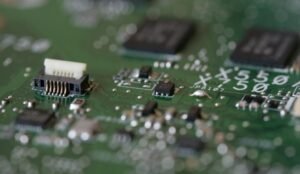Artificial Intelligence Defined
Artificial Intelligence (AI) is the field of computer science devoted to simulating intelligence in machines, allowing them to learn from experience, perform tasks, and make autonomous decisions. It involves the development of algorithms and models that enable computers to mimic human cognitive functions such as perception, reasoning, learning, and problem-solving.
Key Takeaways:
- Artificial Intelligence (AI) simulates intelligence in machines through algorithms and models.
- AI enables computers to mimic human cognitive functions.
- AI involves tasks like perception, reasoning, learning, and problem-solving.
Artificial Intelligence is revolutionizing numerous industries, from healthcare to finance, by enabling machines to analyze vast amounts of data, make accurate predictions, and automate complex processes.
Types of Artificial Intelligence
There are different types of AI systems, each designed for specific functionalities. The two main types are:
- Narrow AI: Also known as Weak AI, this type of AI is designed to perform specific tasks within a limited context, such as voice assistants, recommendation systems, and image recognition software.
- General AI: Also referred to as Strong AI, this is a hypothetical AI system capable of performing any intellectual task that a human being can do. General AI aims to possess human-like intelligence and consciousness. Though it remains a goal for future development, it currently only exists in fiction.
Applications of Artificial Intelligence
Artificial Intelligence has a wide range of applications across various industries. Some notable areas where AI is making an impact include:
- Healthcare: AI is improving medical diagnosis and treatment planning, enabling personalized healthcare, and assisting in drug discovery.
- Finance: AI is used for fraud detection, algorithmic trading, credit scoring, and risk assessment.
- Transportation: AI is powering autonomous vehicles, optimizing traffic flow, and improving logistics and supply chain management.
- Customer Service: AI-powered chatbots and virtual agents are providing personalized customer support and automating customer interactions.
Impact of Artificial Intelligence on Employment
While AI offers numerous benefits, there are concerns about its impact on employment. It is believed that AI may automate certain jobs, leading to job displacement. However, AI also creates new opportunities and can enhance productivity and efficiency. Jobs that require creativity, complex problem-solving, and emotional intelligence are less likely to be fully automated.
| Advantages | Disadvantages |
|---|---|
| Increased productivity and efficiency | Job displacement and potential economic inequality |
| Improved accuracy and precision | Privacy and ethical concerns |
| Automation of repetitive tasks | Lack of human emotions and ethical judgment |
Ethical Considerations in AI
As AI continues to advance, ethical considerations become crucial. Some key ethical issues in AI include:
- Privacy: AI systems deal with sensitive data, which raises concerns about data privacy and security.
- Transparency: AI algorithms can be complex and difficult to interpret, making it important to ensure transparency and understand the decision-making process of AI systems.
- Biases: AI systems can inherit biases from the data they are trained on, resulting in unfair or discriminatory outcomes. Efforts are being made to reduce biases and ensure fairness in AI systems.
- Accountability: Determining responsibility and accountability for AI decisions and actions can be challenging when machines are involved.
| Rank | Country | Total AI Funding (in billions USD) |
|---|---|---|
| 1 | United States | $22.61 |
| 2 | China | $6.61 |
| 3 | United Kingdom | $1.80 |
Conclusion
Artificial Intelligence is transforming industries and reshaping the way we live and work. With its ability to analyze data, learn from experience, and make decisions, AI has the potential to revolutionize various fields and enable us to tackle complex challenges more effectively. However, ethical considerations and responsible use of AI must be addressed to ensure a beneficial and inclusive future.

Common Misconceptions
Artificial Intelligence is Smarter than Humans
One of the common misconceptions about artificial intelligence is that it is smarter than humans. However, it is important to understand that AI is designed to perform specific tasks and make decisions based on programmed algorithms. It lacks human-like qualities such as creativity, intuition, and emotions.
- AI is limited in its capabilities and can only perform tasks it has been specifically programmed for.
- AI lacks self-awareness and cannot possess human-like intelligence.
- AI’s decision-making is solely based on data and algorithms, with no inherent understanding or consciousness.
Artificial Intelligence will Replace Human Jobs Completely
Another misconception is that AI will completely replace human jobs. While AI has the potential to automate repetitive and mundane tasks, it is unlikely to eliminate the need for human workers. AI technology is best suited to complement human skills and enhance productivity in various industries.
- AI is more likely to augment human capabilities rather than replace humans altogether.
- Certain job functions require human empathy, creativity, and critical thinking, which AI currently lacks.
- AI may create new job opportunities as it requires human expertise for development, deployment, and maintenance.
Artificial Intelligence is Perfect and Error-Free
Contrary to popular belief, AI is not completely faultless and prone to errors. Just like any other technology, AI systems are subject to limitations and can make mistakes. The accuracy and reliability of AI depend on the quality of data, algorithms, and the way it is programmed and trained.
- AI systems can produce biased or incorrect results if not properly trained or if the training dataset is biased.
- AI algorithms are only as good as the data they are trained on, and inaccuracies may arise from incomplete or misleading data.
- AI systems may struggle in dealing with unexpected or unfamiliar situations that were not encountered during training.
Artificial Intelligence is a Threat to Humanity
There is a widespread misconception that AI poses a significant threat to humanity, often portrayed in popular media as evil machines taking over the world. However, this portrayal is far from reality. AI technology is developed and deployed with a focus on enhancing human lives, solving complex problems, and improving efficiency.
- AI is designed and programmed with strict ethical guidelines and regulations to prioritize human well-being.
- Misuse or unethical use of AI lies in human hands, rather than in the inherent nature of the technology itself.
- AI technology offers immense potential for societal benefits, including healthcare, transportation, and environmental sustainability.
Artificial Intelligence is Science Fiction
Despite the increasing prevalence and advancements in AI technology, many people still perceive it as science fiction or futuristic. This misconception arises from the portrayals of AI in movies and books, often exaggerating its capabilities and applications beyond what is currently feasible.
- AI is already integrated into many aspects of our daily lives, from voice assistants to recommendation algorithms.
- The progress in AI research and development is grounded in real-world applications and scientific advancements.
- AI is continually evolving and being implemented in various industries, shaping our present and future.

Artificial Intelligence in Everyday Life
Artificial Intelligence (AI) has become an integral part of our lives, revolutionizing various industries and transforming the way we carry out daily tasks. From personal assistants to autonomous vehicles, AI technology continues to advance rapidly. The following tables highlight some interesting aspects of AI’s impact on different sectors.
AI in Healthcare
The healthcare sector has been greatly benefited by AI, improving diagnosis accuracy and patient care. The table below showcases AI applications in healthcare.
AI in Education
Education is another field that has adopted AI to enhance the learning experience for students. The table below presents some fascinating statistics related to AI implementation in education.
AI in Entertainment
AI has revolutionized the entertainment industry, from personalized streaming recommendations to virtual reality gaming. The table below highlights intriguing facts about AI in entertainment.
AI in Financial Services
The financial sector has witnessed significant advancements with the integration of AI technology. The table below provides some interesting data on AI applications in financial services.
AI in Transportation
Autonomous vehicles and smart transportation systems are reshaping the way we commute. The table below showcases fascinating information related to AI in transportation.
AI in Robotics
The field of robotics has experienced remarkable progress due to AI. Advanced robots are being developed for various purposes. The table below illustrates intriguing facts about AI in robotics.
AI in Agriculture
AI is playing a crucial role in improving efficiency and productivity in the agricultural sector. The table below presents fascinating data related to AI applications in agriculture.
AI in Customer Service
AI-powered chatbots and virtual assistants are transforming customer service interactions, providing prompt and personalized support. The table below highlights interesting information about AI in customer service.
AI in Cybersecurity
With the rise of cyber threats, AI has become instrumental in strengthening cybersecurity measures. The table below showcases intriguing data related to AI applications in cybersecurity.
AI in Marketing
AI has revolutionized marketing strategies, enabling targeted advertising and personalized campaigns. The table below highlights interesting facts about AI in marketing.
Artificial Intelligence has brought about significant advancements across various industries, improving efficiency, accuracy, and user experiences. From healthcare to finance, transportation to education, AI continues to shape our daily lives. As AI continues to progress, we can anticipate even more remarkable developments in the future.
Frequently Asked Questions
What is artificial intelligence?
Artificial intelligence (AI) refers to the development of computer systems that can perform tasks that typically require human intelligence, such as visual perception, speech recognition, decision-making, and problem-solving.
How does artificial intelligence work?
AI systems work by utilizing algorithms and data to analyze patterns, make predictions, and learn from experience. They can be designed to process large amounts of data quickly and efficiently to perform specific tasks or provide intelligent insights.
What are some examples of artificial intelligence applications?
Examples of AI applications include voice assistants (like Siri or Alexa), autonomous vehicles, recommendation systems, fraud detection algorithms, language translation tools, and image recognition software.
What are the different types of artificial intelligence?
There are different types of AI, including narrow or weak AI that is designed to perform a specific task, and general or strong AI that aims to exhibit human-like intelligence across various domains. There are also subfields within AI such as machine learning, natural language processing, and computer vision.
Are robots and AI the same thing?
No, robots and AI are not the same. AI refers to the intelligence exhibited by computer systems, while robots are physical machines that can be equipped with AI technology to perform tasks autonomously.
What are the ethical considerations in artificial intelligence?
Some ethical considerations in AI include privacy concerns, biases in algorithmic decision-making, automation leading to job displacement, accountability for AI system failures, and the potential impact of AI on society and human rights.
Can AI replace human jobs?
AI has the potential to automate certain tasks and roles, which may lead to job displacement in some industries. However, it can also create new job opportunities and enhance human productivity by augmenting existing capabilities.
Is artificial intelligence dangerous?
While AI can bring about significant benefits, there are concerns about its potential misuse or unintended consequences. Ongoing research focuses on ensuring AI systems are developed and deployed safely, with proper governance, transparency, and human oversight.
Can AI become smarter than humans?
At present, AI systems are designed to excel in specific tasks, but they lack general human intelligence. It is currently unknown if or when AI could surpass human intelligence.
How is artificial intelligence influencing various industries?
AI has a profound impact across numerous industries, including healthcare, finance, transportation, manufacturing, and entertainment. It enables improved diagnostics, personalized recommendations, efficient processes, predictive analytics, and enhanced customer experiences.




